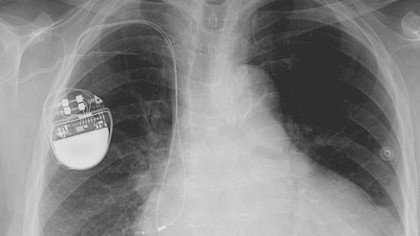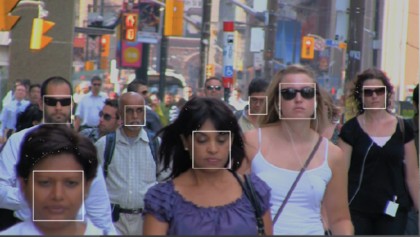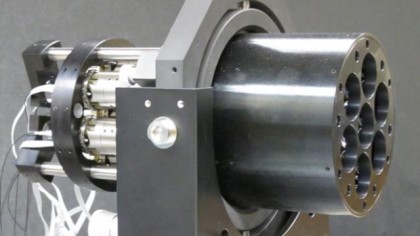10 bits of tech to scare you witless
The future is full of remarkable things, and lots of them want to kill you

Sign up for breaking news, reviews, opinion, top tech deals, and more.
You are now subscribed
Your newsletter sign-up was successful
Every technology has a downside, but some downsides are bigger than others. Mostly, the side effects of today's are just annoying - but in the future they could be fatal.
As cutting-edge tech moves from fiction to everyday reality we'll be able to do things that previous generations could only dream of.
Unfortunately for us, that includes their bad dreams as well as the fun ones. So which technologies will scare us witless? Let's find out.
1. Organ printing
3D-printed artificial hearts may be less than ten years away, according to Stuart Williams of the Cardiovascular Innovation Institute. The benefits of organ printing are obvious - your body won't reject organs grown from your own cells and you don't need to wait for a donor - but the potential effects are interesting and potentially frightening too. Will we live riskier lives when we can print spare parts? How long before we decide we can use the tech to reinvent the human body altogether?
2. Synthetic meat
Meat is bad for your body (if eaten in excess), it has a horrific environmental footprint and it's not exactly great for the millions of animals we kill for food. Modern Meadow is one of several firms with a solution: meat that's made, not cut from a cow.
The tech uses the same tissue engineering that's being explored in medicine, but it uses it to create "cultured meat". There may be safety concerns, but the real worry is whether consumers will find the idea of man-made meat too horrible to contemplate.

3. Hackable humans
In October, a research architect with McAfee reverse-engineered a pacemaker transmitter so that it would deliver a fatal electric shock to any wearer within 30 feet.
Sign up for breaking news, reviews, opinion, top tech deals, and more.
He was able to do it because modern implants are often updatable, so in this case the pacemaker's firmware was flashable and could be configured remotely.
That's great when your implant or prosthetic is being updated by nice people, but it also means humans' hardware can be hacked to deliver anonymous assassinations.

4. Electronic insects
If you find real insects upsetting, wait till you think of the sinister implications of these bug-sized drones. With camera and microphone, they could observe you, track you and even take DNA samples - and they're already close to being reality.

5. Facial recognition
Google has already banned facial recognition apps from Google Glass until the right privacy protection is in place, but that's a drop in the ocean: the tech to scan crowds in real time already exists, and it's getting smarter, faster and more powerful with each incarnation.
Systems such as BioSurveillance NEXT are designed for busy places such as airports, shopping centres and stadiums, and as camera tech improves they're going to become more accurate and more widespread.

6. Intelligent, invasive ads
The intelligent, annoying ads from Minority Report could be closer than you think: tech such as SignEye sticks a camera in a billboard and then uses facial recognition to identify basic criteria such as your age group and gender so it can serve up ads, while Holosonics' audio beams can send spoken or musical messages to specific people without others overhearing. Imagine that tech teamed up with, say, Facebook or Google+, or talking to your wearable health monitors.
7. iPhone iris scanners
"What does the world look like when proving ID is as easy as taking a photograph?" asks The Verge, describing the AOptix "iPhone case for cops" that includes retinal scanning - scanning that might work from 60 feet away. "Like it or not, we're about to find out."
According to the ACLU, biometric identification could be used for "the mass tracking of individuals," turning us into "a kind of checkpoint society." If you thought plans for national ID cards were scary, it's time to dig out the tinfoil.

8. Brain erasers
We've seen them Men In Black and Eternal Sunshine of the Spotless Mind, and now they're coming to the real world: brain erasers that can remove bad, traumatic or politically awkward memories.
They aren't flashy gadgets or massive machines, however: they're chemical cocktails that target particular proteins, undoing the bonds that apparently make us remember specific things.
Good news? Maybe. "There are all kinds of dystopian things one could do with these drugs," neurologist Todd Sacktor told Wired. You're safe for now, though: brain erasers are currently limited to rats.

9. Little lasers
The problem with laser weapons is that they're enormous, and that limits their usefulness: you can hardly drive a battleship down a city street or fly 747s like fighter jets. Enter DARPA, whose research efforts include the Excalibur, a project to make laser weapons much, much smaller - small enough that they can fit in fighter aircraft, drones or small ground vehicles.
Such technology "will enable the practical use of high-power lasers on a broad spectrum of military platforms", with the ability to carry out "precision strikes against both ground and air targets."

10. Bioweapons
Bioweapons have been around since the days of poisoned darts, but today's variants are a lot more deadly. DNA sequencing and synthesis enable scientists to bring back long-dead viruses, such as the 1918 influenza virus recreated in 2004, and as Hillary Clinton put it: "A crude but effective terrorist weapon can be made using a small sample of any number of widely available pathogens, inexpensive equipment, and college-level chemistry and biology."


Contributor
Writer, broadcaster, musician and kitchen gadget obsessive Carrie Marshall has been writing about tech since 1998, contributing sage advice and odd opinions to all kinds of magazines and websites as well as writing more than twenty books. Her latest, a love letter to music titled Small Town Joy, is on sale now. She is the singer in spectacularly obscure Glaswegian rock band Unquiet Mind.